Singapore's labour market showed signs of improvement in the third quarter but the overall picture remains gloomy amid the ongoing Covid-19 pandemic, economists said.
Preliminary data released by the Ministry of Manpower (MOM) yesterday showed that total employment continued to contract, as retrenchments and unemployment rates rose in the July to September period.
But there is a silver lining as overall employment declined at a slower pace. Similarly, the increase in unemployment rates and retrenchments compared with previous months was more muted.
OCBC Bank's head of treasury research and strategy Selena Ling said the jump in overall and resident unemployment rates was as expected, and the rates could creep up further in the fourth quarter.
The resident unemployment rate came in at 4.7 per cent last month, while the overall unemployment rate was 3.6 per cent.
"The pace of retrenchments will hopefully stabilise, but the job prospects still very much depend on the global Covid-19 situation and vaccine developments," Ms Ling said.
Maybank Kim Eng senior economist Chua Hak Bin said: "The Government's generous wage subsidies and hiring incentives have cushioned the impact on locals."
While the job market is on the mend, the recovery will be slow, he said, noting that employment will likely recover to pre-pandemic levels only in 2022 or even 2023.
Dr Chua said the recent increases in the qualifying salaries for Employment Pass and work pass holders will likely dampen and slow the employment recovery for non-locals.
"The hiring of foreigners will likely pick up pace only when the pool of available locals tightens."
Similarly, OCBC's Ms Ling said there may be a limit to how far non-resident employment can bear the brunt of the impact of Covid-19 without affecting the competitiveness of the Singapore economy.
On the prospects ahead, Ms Ling said: "It is a trade-off between the ramping up in economic activities, especially for construction and domestic services once we shift to phase three, and the ticking clock for the various support schemes, such as the Jobs Support Scheme, which will taper off for selected industries going into 2021."
National Trades Union Congress (NTUC) assistant secretary-general and labour MP Patrick Tay emphasised the uncertainty ahead in a Facebook post yesterday.
"I expect both the retrenchment and unemployment figures will continue to stay high in the fourth quarter, as longer-term recovery is expected to be protracted against the continued restrictions in travel activity, ongoing Covid-19 safe management measures and restrictions, as well as an overall uncertain local/global outlook and stance across many industries, with countries encountering second and third waves of outbreak."
Fellow labour MP Desmond Choo, who is also NTUC assistant secretary-general, said in his Facebook post that rising retrenchments in the third quarter are a concern, and the tripartite partners are working closely to support retrenched workers and job seekers and help them find new jobs more quickly.
He encouraged companies that are performing well to reward workers fairly, while urging affected firms to tap cost-saving measures to reduce job losses and the Jobs Growth Incentive to increase hiring.
In its report, MOM noted that salary and headcount reductions could subside in the months ahead as business sentiments and economic conditions improve.
A poll of companies in September showed that the proportion of firms indicating that they intended to cut salaries or headcount has been on a downtrend since May. At the same time, more companies plan to hire in September compared with previous months.



